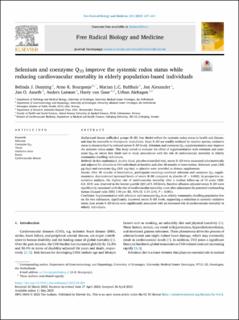Selenium and coenzyme Q<inf>10</inf> improve the systemic redox status while reducing cardiovascular mortality in elderly population-based individuals
Dunning, Belinda J.; Bourgonje, Arno R.; Bulthuis, Marian L.C.; Alexander, Jan; Aaseth, Jan; Larsson, Anders; van Goor, Harry; Alehagen, Urban
Peer reviewed, Journal article
Published version
Permanent lenke
https://hdl.handle.net/11250/3106217Utgivelsesdato
2023Metadata
Vis full innførselSamlinger
Originalversjon
Free Radical Biology & Medicine. 2023, 204 207-214. 10.1016/j.freeradbiomed.2023.04.024Sammendrag
Background Serum sulfhydryl groups (R–SH, free thiols) reflect the systemic redox status in health and disease, and may be amenable to therapeutic modulation. Since R–SH are readily oxidized by reactive species, oxidative stress is characterized by reduced serum R–SH levels. Selenium and coenzyme Q10 supplementation may improve the systemic redox status. This study aimed to evaluate the effect of supplementation with selenium and coenzyme Q10 on serum free thiols and to study associations with the risk of cardiovascular mortality in elderly community-dwelling individuals. Methods In this randomized, double-blind, placebo-controlled trial, serum R–SH were measured colorimetrically and adjusted for albumin in 434 individuals at baseline and after 48 months of intervention. Selenium yeast (200 μg/day) and coenzyme Q10 (200 mg/day) or placebo were provided as dietary supplements. Results After 48 months of intervention, participants receiving combined selenium and coenzyme Q10 supplementation demonstrated increased levels of serum R–SH compared to placebo (P = 0.002). In prospective association analysis, the highest rate of cardiovascular mortality after a median follow-up of 10 years (IQR: 6.8–10.5) was observed in the lowest quartile (Q1) of R–SH levels. Baseline albumin-adjusted serum R–SH were significantly associated with the risk of cardiovascular mortality, even after adjustment for potential confounding factors (hazard ratio [HR] 1.98 per SD, 95% CI: 1.34–2.91, P < 0.001). Conclusion Supplementation with selenium and coenzyme Q10 to an elderly community-dwelling population low on the two substances, significantly improved serum R–SH levels, supporting a reduction in systemic oxidative stress. Low serum R–SH levels were significantly associated with an increased risk of cardiovascular mortality in elderly individuals.

